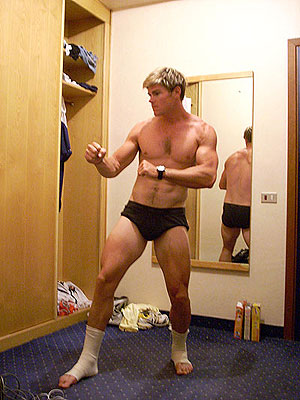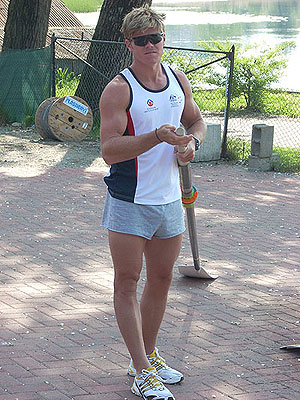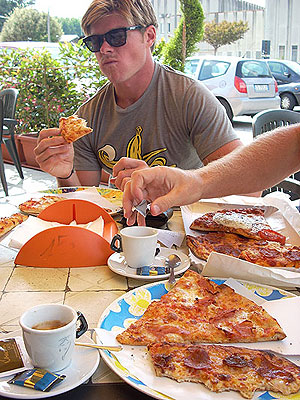'An iconic roster': LeBron, Steph, KD headline all-star cast for Team USA's shot at Olympic glory
LeBron James is going back to the Olympics for the first time in 12 years. Steph Curry is headed to the games for the…
In this edition, I’ve interviewed Australian men’s eight crewmate Sam Loch, a self-confessed institutionalised 24-year-old from Whale Beach in Sydney who lists protein and lactate buffering amongst his interests.
For a bit of background, Sam (or Spock as he’s known around the boat shed) started rowing at school in 1996 and upon completing his high school studies, headed to the United States for four years of study at Princeton University, an Ivy League school in New Jersey. He excelled in their rowing program, stroking their senior (Varsity) crew to many victories. He returned to Australia in mid-2006 and earned an AIS scholarship in October of that year, giving him the brief, probationary opportunity to impress the Australian coaches.
Spock and I were put in a coxless pair for that season and later both won selection in the Australian coxless four. This year we were again put in a pair and improved our ranking in the Australian selection trials which eventually led to selection in the men’s eight. We’ve spent a lot of hours training together, discussing strategies, technical nuances of the pair and how to overcome our poorer performances of 2007.
Sam Loch

His determination and doggedness towards training is probably second to none of all the athletes I’ve worked with over the years. He looks after his body with everything he does. Everything that goes in, or near, his body serves some functional purpose that will assist in making him a better oarsman. He is disciplined, focussed and quietly determined to prove, or disprove, peoples opinions of him and validate the strong sense of self belief he has in himself.
I have thoroughly enjoyed partnering with him over the past two seasons and I’m extremely proud of what we’ve achieved together to date.
———————————————————————————–
JC: What experience do you think you’ve been able to bring from the Princeton training program to the Australian team?
SL: In the wintry north-east corner of the USA, rowing is ruled out for 6 months of the year because the lakes are frozen. Therefore, the ability to have a certain disregard for boredom in the undertaking of grossly extended periods of cross training.
JC: How long is a grossly extended period of cross training in the US College system? What are the kind of sessions you guys did in the winter in order to be rowing fit when you couldn’t actually row?
SL: During the winter when the lake’s frozen, we would do sessions that were as long as 2 hours on the rowing machine, which is quite a long time on that particular apparatus. Or on the occasion when the crew was disbanded for disciplinary infractions (not uncommon with college students), we would abuse our access to the communal campus gymnasium and do cardiovascular training on various machines such as stationary bikes, elliptical machines, stair masters, and treadmills for upwards of 3-4 hours.
An obvious difference between the two training systems is the blatant disregard for technical prowess during anything that isn’t considered a timed training piece. For instance, my first coach at Princeton, Greg Hughes (who is also a US National Team coach), insisted the rowing stroke was like a floating leg-press, which is a concept you wouldn’t hear many Aussie coaches promoting (due to their more rigid technical focus), but a concept I still, very much, believe in.
JC: What are some of the ergo protocols when you couldn’t row on the water that would be encouraging this BRUTAL application of power?
SL: Most of the pieces were over specific distances as fast as you could go. Always as fast as you could go. This created an environment of ongoing and unrelenting competitiveness, mano-e-mano.
JC: Can you please run thru the multitude of nick names you’ve received this tour?
SL: Brooks, Brooks Bikram, Bobby Bikram (technically from a prior tour), most recently ‘Tankles’, ‘Cankles’, Hop-a-long, Geisha, self-annointed Jean Claude Van Damme, when clad only in underpants…Derps Van Damme.
JC: Could you please try and explain one of these nicknames?
SL: Apparently Brooks is in reference to a Shawshank Redemption character who due to his extended period of incarceration is, upon release, incapable of dealing with the outside world. This is relatively similar in many regards to my extended period of time in various institutions… boarding school, college in US, and the Australian Institute of Sport. All the other nicknames are references to my penchant for yoga or my recent almost simultaneously spraining of both left and right ankles.
JC: So, how long have you been institutionalised for in total?
SL: Going on 14 years.
JC: How long do you intend to be institutionalised for?
SL: For as long as possible ideally. So the likely options are either the armed forces, prison or a mental health facility.
JC: What is your attraction to being institutionalised?
SL: Structure, integrated time organisation and little to no interaction with civilians.
JC: How did you feel about the 8’s gold-medal performance at the 1st World Cup event in Munich recently?
SL: It’s quite exciting given that we were able to perform reasonably well relative to some of our competition that will be in the Olympics – especially given the early phase of our preparation and that we were without our full compliment of oarsmen.
JC: You mentioned that the crew is in its early phase of preparation. What are you’re expectations from the next phase of preparation?
SL: In many aspects we will continue with some of the same stuff we’ve done to date. But our coach, Richo and our physiologist, Tony Rice, will refine both our technical prowess and physical capabilities, respectively.
JC: What assumptions – rightly or wrongly – did you make about coming into the Australian system after four years overseas?
SL: I correctly assumed it wouldn’t be easy to re-integrate myself into Australian rowing, particularly at the elite level given that when I left Australia I was marginally overweight and essentially a schoolboy.
JC: Can you please elaborate on “marginally overweight”?
SL: Marginally overweight for a schoolboy, but I thought that during my years abroad I’d become a more capable oarsman with enough determination I’d be able get to where I currently am now.
JC: What do you think enabled you to gain Olympic selection in your second season in the Australian system and your second year in the senior team?
SL: I would say the initial help of Tim McLaren (former UTS Rowing Club Head Coach – now working in California) and the willingness of Richo to have me down at the AIS based on performances in the US. But also the help of a fine pair partner – that’s you mate! – and being able to learn from other fine oarsmen in the squad.
In particular, however, the willingness of my parents to watch me squander an Ivy League education for at least a few years whilst I chase my dreams.
JC: What were you studying at Princeton University?
SL: It was one part the seduction of lovely, nubile co-eds; one part the rigorous enjoyment of lactic threshold training; and three parts the initially unpleasant Ivy League academic standards which later became entirely enjoyable. I majored in Anthropology.
JC: What are you looking forward to after the Olympics?
SL: Enjoying a well earned rest in which time I’ll consume much lager and unadulterated amounts of pizza and chocolate. Soon after I’ll re-commence training, but I may also have to gain employment, dammit.


James has been selected in the Australian men’s eight for the Beijing Olympics. He will be producing a diary for The Roar in the lead-up to the start of the Games on August 8. You can receive emails of James’ column by signing up here.